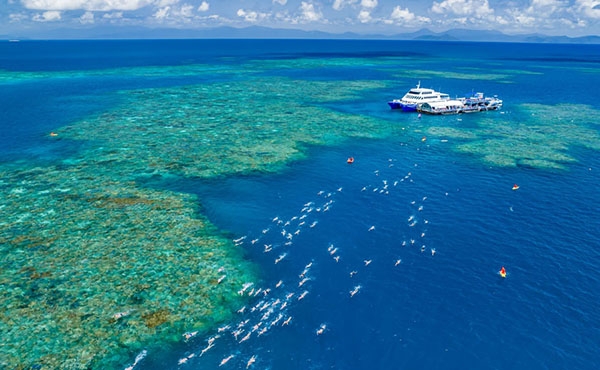The Reef contributes significantly to the Australian economy, to First Nations peoples who depend on it for traditional use, social and cultural purposes, and to the livelihoods, wellbeing and lifestyles of local communities. Despite the effects on commercial and non-commercial use from management of the COVID-19 pandemic, the economic and social benefits are rated as very good.
The Reef continues to provide significant economic and social benefits
The COVID-19 pandemic affected most direct use due to national and international border closures and disruptions to market chains. Tourism visitation was greatly reduced during this time but is starting to recover. Reductions in international trade and exports affected commercial fishing, shipping and port industries. Border closures also led to a reduction in charter fishing. In contrast, the COVID-19 pandemic is understood to have led to an increase in recreational use of the Region.
The COVID-19 pandemic affected most direct use
Most direct use of the Region is localised and rated as high impact. As the population grows, use of the Region and associated impacts are also likely to increase. Marine incidents involving small vessels have continued to rise. The cumulative effects of direct use, coupled with a deterioration of various natural and heritage values, amplifies the identified impacts.
Impacts of most direct use are localised, but add up across the Region
Commercial marine tourism fishing, ports and shipping are economically significant uses of the Region. The impacts of tourism and ports are localised to a few well-managed areas. By contrast, fishing occurs throughout the Region. Fishing is a high-impact activity, and while there have been improvements through ongoing reforms under the Sustainable Fisheries Strategy, some aspects remain a concern, particularly in relation to depleted stocks and information gaps. Fishing reforms and future shifts to low emissions fuel sources in the shipping industry may lead to reduced impacts from direct use.
Defence activities in the Region contribute to Australia’s national security capability while generating economic benefits. While defence use is localised, expansion of the Shoalwater Bay Training Area will see increased economic benefits and potentially greater impact in the training areas.
People undertake recreation in many ways throughout the Region. The impacts of recreational activities (excluding fishing) are low and generally associated with inshore areas around major coastal communities. Vessel registration has continued to increase with a growing Queensland population. The cumulative impacts of recreational use remain largely unknown.
Research and educational activities are continuing to provide vital contributions to management of the Reef. A growing research and development program into potential Reef interventions is driving changes in research activities on the Reef, including novel approaches not yet trialled in the Region. Contemporary information on the contributions of research and educational activities to the Region’s economy is lacking.
Managing agencies continue partnering with Traditional Owners through Traditional Use of Marine Resource Agreements and Indigenous Land Use Agreements to protect Indigenous heritage values, conserve biodiversity and enhance Reef resilience. These programs help Traditional Owners maintain connection with Land and Sea Country. There are 10 Traditional Use of Marine Resource Agreements and 2 Indigenous Land Use Agreements in place which cover around 46 per cent of the Region’s coastline.


